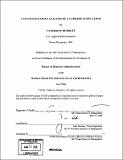A system dynamics analysis of a Capilene supply loop
Author(s)
Humblet, Catherine
DownloadFull printable version (29.03Mb)
Other Contributors
Sloan School of Management.
Advisor
John Sterman.
Terms of use
Metadata
Show full item recordAbstract
In August 2005, Patagonia announced its Common Threads Garment Recycling Program. The company is reclaiming used Capilene long underwear from consumers and using them as an input for new Capilene garments. According to company assessments, making clothes from post-consumer fabrics is more energy efficient and emits fewer greenhouse gases than making garments from traditional, petroleum-based, materials. Patagonia has a long history of considering both the economic and environmental impacts of their business decisions and it is an integral part of their brand. Changing business conditions and the rise of environmental consciousness among consumers have made supply loops an increasingly important topic in supply chain management. This is especially true in the electronics industry where the European Union has legislated mandatory recycling of all electronics products sold within its borders, as a response to environmental concerns. Electronics recycling is complex: the products are difficult and often hazardous to disassemble, recycling is often done overseas, and there are many players in the industry. Patagonia's Common Threads Garment Recycling Program, on the other hand, is a simple supply loop. (cont.) There are two major players: Patagonia, a large outdoor apparel company based in California, and Teijin, a polyester manufacturer in Japan. There is one product being recycled: Capilene, a polyester fabric used in thermal underwear and technical outerwear. This simplicity makes it an excellent system to model. This thesis assesses different rebate structures that Patagonia can use to induce customers to return their old clothes and the impact of these rebates on the overall success of the program as measured by profitability, volume and the recycled content of new garments. There are other factors, such as consumer education and word of mouth that also drive customer behavior. The framework developed here can be used in the future to analyze the effect of different levers, such as consumer education or technology changes, on the profitability and viability of this supply loop.
Description
Thesis (M.B.A.)--Massachusetts Institute of Technology, Sloan School of Management, 2006. Includes bibliographical references (leaves 119-120).
Date issued
2006Department
Sloan School of ManagementPublisher
Massachusetts Institute of Technology
Keywords
Sloan School of Management.